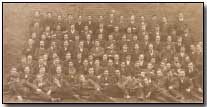Encyclopedia - Conscientious Objectors
 Defined as those men who
refused conscripted combat service conscientious objectors were common to armies on
all sides of the war. Such men would decline to
serve for a variety of reasons although the primary reasons were religious
(e.g. Jehovah's Witnesses or Quakers)
and moral - a disinclination to harm one's fellow man.
Defined as those men who
refused conscripted combat service conscientious objectors were common to armies on
all sides of the war. Such men would decline to
serve for a variety of reasons although the primary reasons were religious
(e.g. Jehovah's Witnesses or Quakers)
and moral - a disinclination to harm one's fellow man.
The fate of men who refused to be conscripted was usually determined by a tribunal. Although many men were permitted full exemption from military service in any form, most were expected to serve non-directly, i.e. in other than a combat capacity, either at home (in an avenue such as farming) or in non-combatant or army medical corps as cooks, medical orderlies, stretcher-bearers, etc.
In many countries, including Germany, Austria, Russia, France and Italy, members of the clergy (of all faiths) were also expected to serve their country in some form during wartime. Again, those who objected on moral grounds to the taking of lives were handed non-combatant duties, even though these might also take them to the battlefields, e.g. as stretcher-bearers, etc.
Men who refused to serve in defiance of the ruling of a tribunal were invariably court-martialed and sentenced to prison terms of varying lengths; public shame was almost always heaped upon them. In Britain conscientious objectors - conscription was belatedly introduced in 1916 with the Military Service Act - who had totally declined to serve were deprived of their right to vote for five years, although this was not always enforced. Some 16,000 men were officially recorded in Britain as 'COs' during the First World War.
A howitzer is any short cannon that delivers its shells in a high trajectory. The word is derived from an old German word for "catapult".
- Did you know?
